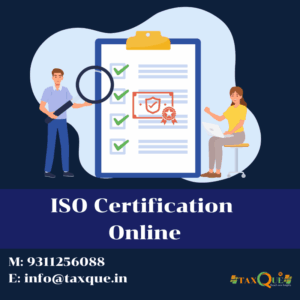What is ISO Certification?
ISO certification is an internationally recognized endorsement that a business’s processes, products, or services meet specific quality, safety, or efficiency standards set by the International Organization for Standardization (ISO). Common standards include:
ISO 9001: Quality Management Systems
ISO 14001: Environmental Management Systems
ISO 27001: Information Security Management Systems
Who Should Apply for ISO Certification?
Manufacturers and production units
Service providers (IT, consulting, logistics, etc.)
Startups and established businesses seeking global credibility
Organizations aiming to improve quality, efficiency, and customer satisfaction
Key Benefits of ISO Certification
Enhanced business credibility and trust
Improved operational efficiency and process standardization
Access to new markets and eligibility for government tenders
Increased customer satisfaction and retention
Legal and regulatory compliance
Required Documents for ISO Certification
| Document Type | Details/Description |
|---|---|
| Business Registration Proof | Certificate of Incorporation, GST, MSME, or equivalent |
| PAN Card | Of the business or authorized signatory |
| Address Proof | Utility bill, rent agreement, or property tax receipt |
| Quality Policy & Manual | Documented quality policy and management framework |
| Organizational Structure | Process flowcharts, organizational chart, and roles |
| Operational Process Details | Standard Operating Procedures (SOPs), work instructions, and process records |
| Internal Audit Reports | Results of internal audits (if available) |
| Employee Training Records | Documentation of staff training and quality control measures |
| Bank Account Details | Cancelled cheque or bank statement (if required) |
| Other Supporting Documents | As required for specific ISO standards or by the certification body |
ISO Certification: Step-by-Step Process
1. Initial Consultation and Gap Analysis
Assess your business needs and select the appropriate ISO standard.
Conduct a gap analysis to identify areas needing improvement.
2. Documentation Preparation
Prepare and organize all required documents, including quality manuals, SOPs, and policy documents.
3. Implementation of Management System
Implement the required management system (QMS, EMS, ISMS, etc.) across your organization.
Train employees and ensure all processes align with ISO standards.
4. Internal Audit
Conduct an internal audit to verify compliance and identify any non-conformities.
5. Application Submission
Submit your application and documentation to an accredited ISO certification body.
6. Certification Audit
Stage 1 Audit: Review of documentation and readiness assessment.
Stage 2 Audit: On-site audit to verify implementation and effectiveness of the management system.
7. Address Non-Conformities
Rectify any issues or non-conformities identified during the audit.
8. Certification Issuance
Upon successful audit, receive your ISO certificate, valid for three years (with annual surveillance audits).
ISO Certification Compliance Checklist
| Step/Requirement | Description |
|---|---|
| Eligibility Check | Confirm the relevant ISO standard for your business |
| Document Collection | Gather all required documents and process records |
| System Implementation | Implement the management system as per ISO requirements |
| Employee Training | Train staff on new processes and quality standards |
| Internal Audit | Conduct and document internal audits |
| Application Submission | Apply to an accredited certification body |
| Certification Audit | Undergo Stage 1 and Stage 2 audits |
| Non-Conformity Resolution | Address and document corrective actions |
| Certificate Receipt | Obtain and retain the ISO certificate |
| Surveillance Audits | Prepare for annual audits to maintain certification |
Frequently Asked Questions (FAQs)
What is the typical timeline for ISO certification?
The process usually takes 2–6 months, depending on the organization’s size and complexity.
Can any business apply for ISO certification?
Yes, any legally registered business can apply, regardless of size or industry.
What are the most common ISO standards?
ISO 9001 (Quality Management), ISO 14001 (Environmental Management), and ISO 27001 (Information Security) are among the most widely adopted.
Is ISO certification valid permanently?
No, ISO certificates are typically valid for three years, with annual surveillance audits required to maintain certification.
What happens if non-conformities are found during the audit?
You must address and correct all non-conformities before certification is granted.
Get Started
Contact us today for expert assistance in obtaining your ISO certification. Experience a hassle-free, secure, and fully compliant process—so your business can achieve global standards and unlock new opportunities.
Let our professionals handle your ISO certification so you can focus on quality and growth.





Reviews
There are no reviews yet.